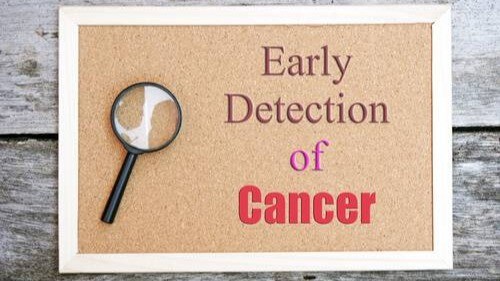Dheeraj Garg, Founder of IMHEALTHY.IN, shared a post on LinkedIn:
“Cancer is often considered a silent enemy, gradually developing unnoticed until it progresses to advanced stages.
However, in many cases, the body provides early clues that something is wrong. The key lies in understanding and recognizing these subtle signs to seek timely medical evaluation.
This article explores the early warning signals of cancer and emphasizes the importance of being proactive about your health.
Important: This article is for informational purposes only and is not a substitute for professional medical advice, diagnosis, or treatment. If you experience any concerning symptoms, please consult a qualified healthcare professional.
Why Early Detection Matters
Your body often sends subtle messages when something is wrong. While these symptoms may not always indicate a serious condition like cancer, ignoring them could delay a potentially life-saving diagnosis. Many cancers, such as breast, cervical, and colorectal cancers, are highly treatable and even curable when detected early.
Early detection dramatically improves the chances of successful treatment, often enabling less invasive procedures, reducing healthcare costs, and enhancing quality of life. Despite this, many people dismiss initial symptoms, attributing them to stress, aging, or minor health issues. Delaying medical attention allows potentially serious conditions to progress, complicating treatment options and outcomes.
It’s always better to investigate and find nothing serious than to overlook signs that could signal a more severe issue. Understanding the early signs and trusting your instincts can make a profound difference. Encourage loved ones to stay informed and proactive, as acting promptly could truly save lives.
General Early Signs of Cancer
While specific cancers exhibit distinct symptoms, some general signs are common across multiple types. These symptoms are not definitive proof of cancer but warrant medical evaluation if persistent.
1. Unexplained Weight Loss
Losing weight without dieting or increasing physical activity could signal cancers such as pancreatic, stomach, or esophageal cancer. This occurs because tumors may alter the body’s metabolism, causing a catabolic state where muscle and fat are broken down.
2. Persistent Fatigue
While fatigue is common in daily life, persistent and unexplained exhaustion can indicate blood cancers like leukemia or lymphoma. Cancer-related fatigue is often not relieved by rest and may be accompanied by other symptoms like night sweats or pale skin.
3. Fever
Recurrent fevers, especially without signs of infection, can suggest cancers affecting the immune system, such as leukemia or lymphoma. Tumors can also release substances that disrupt the body’s temperature regulation.
4. Pain
Chronic, localized pain may be an early indicator of certain cancers. For example, persistent back pain could be linked to pancreatic or kidney cancer, while bone pain might indicate bone cancer or metastasis.
5. Changes in Skin
The skin is an excellent indicator of underlying health issues. Darkened skin (hyperpigmentation), yellowing (jaundice), redness, sores that don’t heal, or changes in moles can point to skin cancers or systemic issues caused by internal malignancies.
When to See a Doctor
It’s natural to dismiss occasional discomforts or changes in your body as minor inconveniences, signs of stress, or simply a part of aging. However, certain symptoms may signal a deeper issue, including the possibility of cancer. If you notice any persistent or unusual symptoms, it’s essential to take them seriously and consult a healthcare professional. Here are key instances when you should seek medical attention:
Symptoms Persist Beyond Two Weeks
Many non-serious conditions resolve on their own within a couple of weeks. However, if a symptom like a persistent cough, unexplained pain, or changes in bowel habits lasts for more than 14 days, it’s time to get it checked.
Symptoms Worsen Over Time
Any symptom that progressively worsens—such as increasing pain, growing lumps, or declining energy levels—requires urgent evaluation. Progressive changes often indicate an underlying issue that isn’t resolving naturally.
Symptoms Disrupt Daily Life
If you find it difficult to carry out normal activities due to persistent fatigue, breathlessness, or discomfort, this could be a sign of a serious health condition. Disruption to your work, sleep, or social life is a significant red flag.
Unusual Combinations of Symptoms
Symptoms like fatigue paired with unexplained weight loss, or persistent fever alongside night sweats, may point to systemic illnesses, including cancer. The presence of multiple symptoms together often warrants closer investigation.
Visible or Tangible Changes in Your Body
Noticeable lumps, discoloration, non-healing wounds, or changes in the size or shape of body parts (e.g., breasts, moles, or lymph nodes) are physical signs that require prompt medical attention.
Bleeding Without an Obvious Cause
Unexplained bleeding, whether it’s blood in the stool, urine, or coughing up blood, is never normal and should be evaluated immediately.
Difficulty Swallowing or Breathing
Persistent issues with swallowing, breathing, or a sensation of something stuck in your throat or chest may be early signs of cancers affecting the throat, lungs, or digestive tract.
Sudden and Significant Changes in Bodily Functions
Any abrupt changes, such as altered vision, sudden weakness, or neurological symptoms like confusion or loss of balance, should not be ignored. These might not always indicate cancer but can be indicative of other serious health conditions.
Symptoms That Seem Out of Place for Your Age
Certain symptoms, such as bone pain, blood in stool, or extreme fatigue, might not be common for your age group. Always err on the side of caution and consult a doctor if something feels off.
- American Cancer Society. ‘Signs and Symptoms of Cancer.’
- National Cancer Institute. ‘Cancer Screening Overview.’
- Mayo Clinic. ‘Early Cancer Warning Signs.’
- World Health Organization. ‘Cancer Facts.’”



